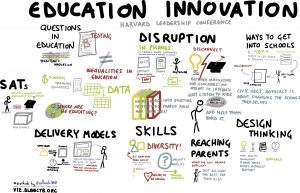I was going to call this entry the “Tragedy of the Anticommons” but economists have already coined anticommons to refer to something entirely different than what I want to talk about. (An anticommons is something that would be socially beneficial as a commons, but for reason of law or raw power, is controlled by a  private actor to the detriment of most. For example, patent intellectual property.)
private actor to the detriment of most. For example, patent intellectual property.)
Today’s post is about resources that actually become more valuable as more people that use them. This is something like the network effect that many Internet services enjoy, but applies broadly to many societal projects. I’m talking about things like schools and insurance markets, libraries, emergency preparedness, etc that benefit from wide participation.
I decided to write this post after I found out that several of our son’s primary-grade compatriots will not be returning to public school next year. Instead, they will be going to various private institutions. Interestingly, some of the parents took the time to write messages to the left-behinds explaining that their decision was not due to any kind of inadequacy of the school, but just a desire to do “what’s best” for their child.
It’s difficult to argue that a parent should not do “what’s best” for his or her kid, but I’m going to take a shot at it anyway, because that approach to parenting taken to its logical endpoint, is deeply antisocial. And while I think US history doesn’t have many examples of destructive trends continuing “to their logical endpoints,” I fear that this time may be different.
Your child in school is not just consuming an education — he or she is part of someone else’s education, too. In important ways, school is a team sport, and everyone does better if more people participate. This is not only true kids whose parents have lots of spare time and resources to participate in school activities. It is just as true among kids whose parents do not have the time or money to participate heavily. All children bring a unique combination of gifts, talent, and complexities that enhance the learning experience for others. Attending a school with rich participation across the socioeconomic spectrum enlarges everyone’s world view, to everyone’s benefit.
Now, am I asking people with the ability to opt for a private education to altruistically sacrifice their children for someone else’s benefit? I guess the answer is a definite “kinda.” Kinda, because I think it is a sacrifice only if everyone acts unilaterally, and that is the essence of the problem.
You see, there is a prisoner’s dilemma type of situation going on here. If we all send our kids to public school, we are all invested together, and we will want the appropriate resources brought to bear on their education. The result is likely a pretty good school. But if enough people “bail” the school will be deprived of their children’s participation. Furthermore, “exiters” have a strong incentive not to continue to have significant resources provided to the school. Such resources come from taxes and exiters and their children will derive no direct benefit from them. Perhaps nobody they personally even know will derive any such benefit. (There are plenty of indirect benefits to educating other people’s kids, but that’s another article.) As more and more people peel off, the school is diminished and the incentive to peel off becomes ever greater — the dreaded death spiral. At last the school is left only with the students from families unable or uninterested in leaving. (NB: I am not suggesting that the “unable” and “uninterested” go together in any way, only that that’s who will be left at such a school.)
In the language of game theory, we reach a Nash equilibrium. Everyone who cares and has the means has defected, and the public schools are ruined. The interesting thing about Nash equilibria is that a better and cheaper outcome is possible for everyone if participants trust each other and cooperate. (After all, private school costs a lot and serious studies show that they underperform public schools.) So, I’m not suggesting altruism per se, but something more akin to an enlightened model of cooperation.
But today’s blog post isn’t even about public primary education. It is about the general phenomenon, which I fear is widespread, of people “pulling the ripcord” on important societal institutions and resources — bailing out, to varying degrees, based on their ability to do so. Consider:
- Gated communities, private security forces, and even gun ownership for protection, represent people rejecting the utility of civil policing.
- Water filters and bottled water are people rejecting the need for a reliable water supply.
- Skipping vaccinations are people rejecting the public health system
- Sending kids to private colleges and universities is pulling the ripcord on state university systems, and the many, many societal benefits that come with them (open research, an educated populace, etc)
- Uber, and eventually, self-driving cars represent rejecting transit (perhaps shredding a ripcord that was pulled long ago with the widespread adoption of the automobile)
- Pulling out of subscription news outlets, leaving them to cheapen and become less valuable
Here are some you may not have heard of that I think are coming:
- Private air travel as an escape from the increasingly unpleasant airline system, with decreased investment, safety, and reliability of the latter over time
- Completely energy self-sufficient homes (with storage) as an escape from the electric system, with a total cost well in excess of an integrated electric system
Another example: as many of you know, I’ve also been dabbling quite a bit in amateur radio. In that hobby, I have discovered a large contingent of hams who are prepping for TEOTWAWKI — The End Of The World As We Know It. They are stocking up on food, water, and ammunition in preparation for society’s total collapse. What I find upsetting about this is that such prepping probably makes collapse more likely. These people are not pouring their resources into community emergency prep groups nor or they the types to advocate for taxation to pay for robust emergency services. Instead, they’re putting resources into holes in their backyards.
All of these are rational decisions in a narrow sense (even the anti-vax thing) and probably cause little or no harm assuming few others make the same decision. However, once many people start to make these decisions, things can unravel quite quickly. (Regarding anti-vax, these effects can already be seen in outbreaks in certain communities with a high penetration of opt-outs.)
Perhaps some of these are “OK”, even better than OK. People abandoning broadcast television for subscription media is bad for broadcast television, but maybe that’s fine; we certainly don’t owe TV anything. (On the other hand, major broadcast networks that had to satisfy a huge swath of the populace at once were forced into compromises that had certain societal benefits: like everyone getting more or less the same news.)
But I worry that we are in a time of dangerously anti-social behavior, enhanced by a party whose ideology seems not only to reject socialism but to reject the idea that “society” exists at all. In the process, they seem willing to destroy not only social programs that deliberately transfer wealth (social insurance, etc), but also any social institution built on wide group participation. Even among people not predisposed to “exit,” growing inequality and the fear of its consequences may encourage — or even force — people to consider pulling the ripcord, too. The result, if this accelerates, could be disaster.






